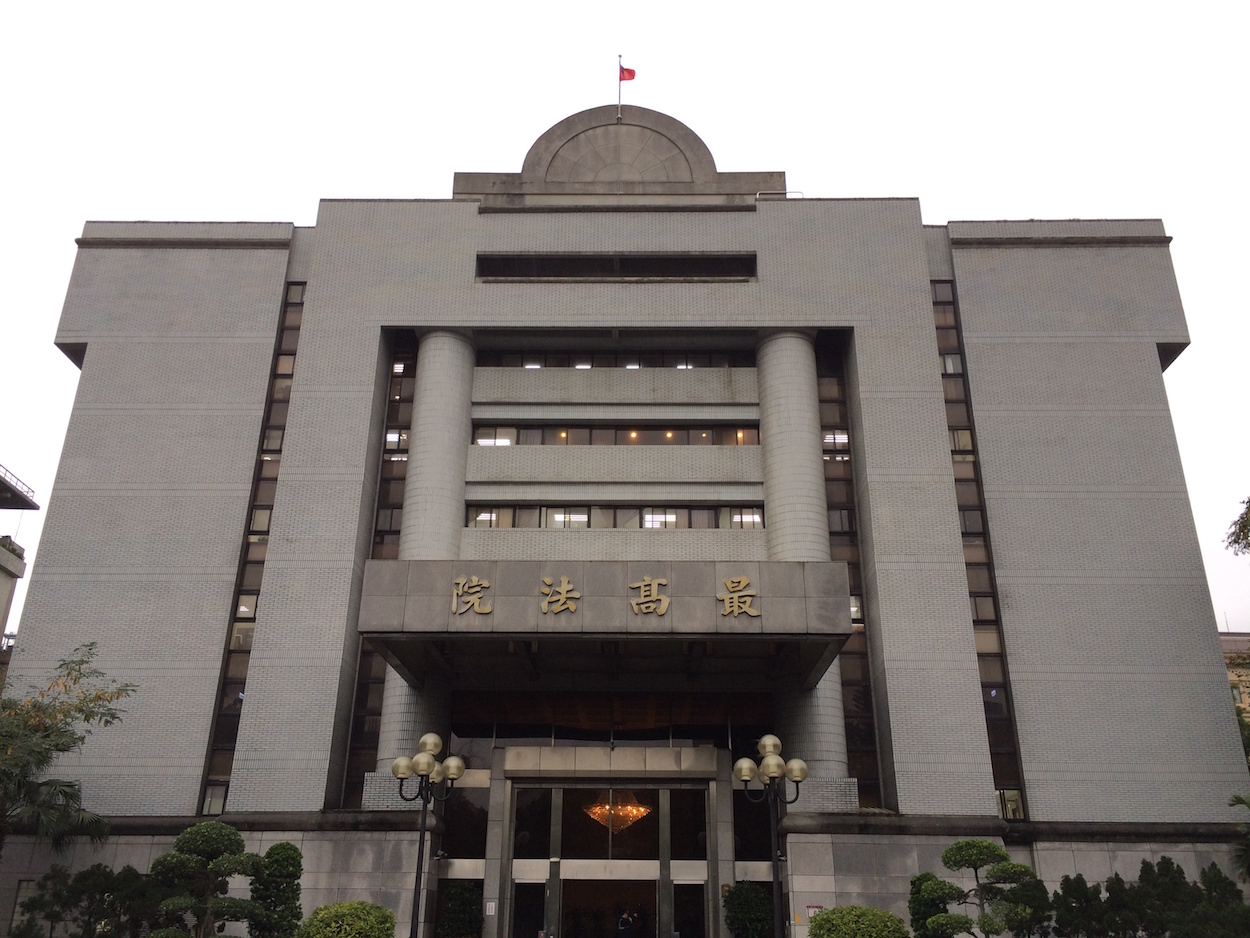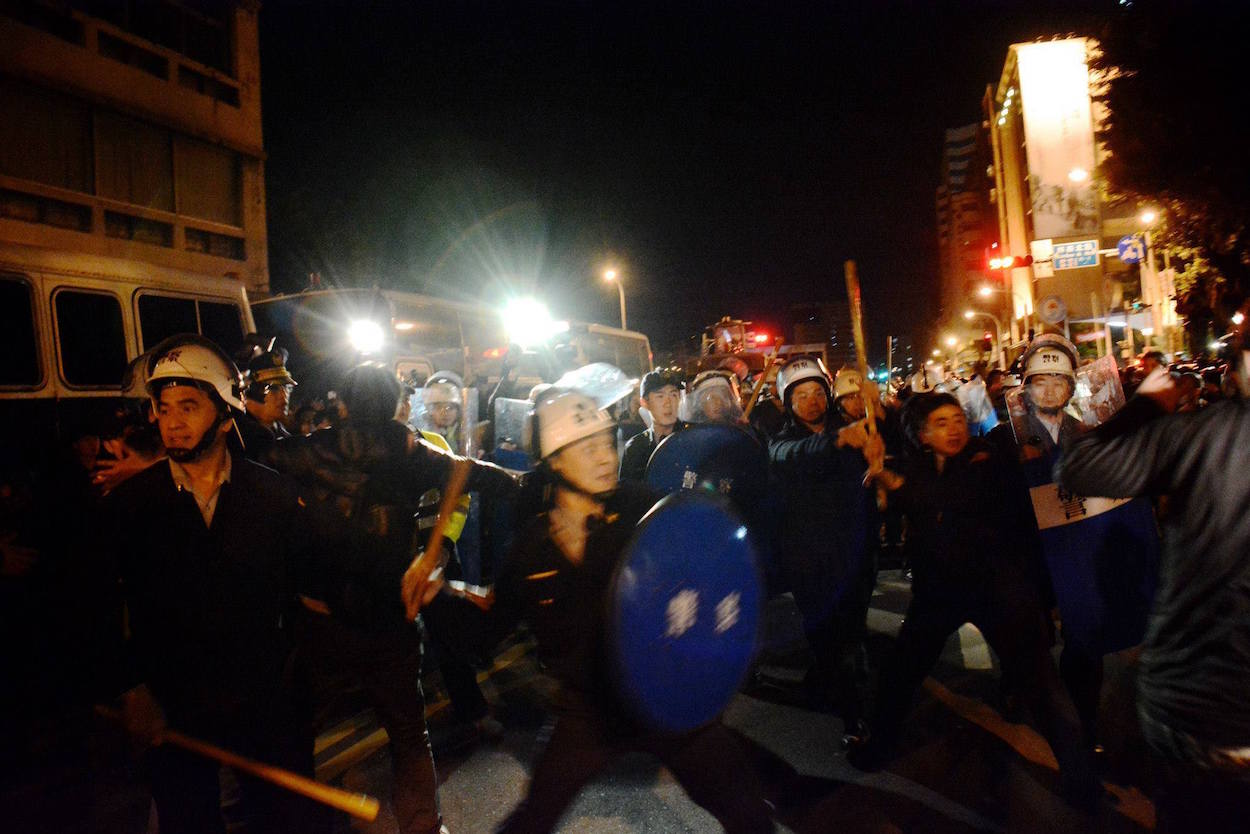by Brian Hioe
語言:
English
Photo Credit: Venation/WikiCommons/CC
A SUPREME COURT case involving eight Sunflower Movement activists involved in the attempted occupation of the Executive Yuan on the night of March 23rd, 2014 resulted in the case being sent back to the High Court, with a call for more lenient sentences.
Among the eight are prominent activists involved in the movement including Wei Yang, the son of Transitional Justice Commission chair and scholar Yang Tsui, also known as Denis Wei, Chen Ting-hao, and Yoshi Liu, the latter of which is best known for his alignment with the right independence Formosa Alliance. The Supreme Court stated that the actions of the eight individuals were civil obedience and so should receive a lighter sentence.
 The Supreme Court. Photo credit: James9052311/WikiCommons/CC
The Supreme Court. Photo credit: James9052311/WikiCommons/CC
Originally, the eight individuals would have received between two to four years in jail. This ruling from the Taipei High Court in April 2020 that sentenced the eight to jail time overturned previous not guilty rulings from 2017, prompting much outrage at the time. Either way, the sentencing against the eight individuals was still a significant decrease in the number of individuals charged; originally, the government sought to charge 132 people involved in the attempted occupation.
While charges against individuals involved in the Legislative Yuan occupation were dropped in 2017, on the basis that their actions were justified civil disobedience, some took the view that the government still wished to carry out punitive measures against individuals involved in the Executive Yuan occupation as a deterrent measure against the future occupation of government buildings.
This occurs despite the fact that many individuals involved in the Sunflower Movement now hold high public office, including former student leader Lin Fei-fan currently serving as deputy secretary-general of the DPP, as well as legislators such as Freddy Lim, Handy Chiu, and Lai Pin-yu, and city councilors such as Meredith Huang, Miao Po-ya, and others. Notably, DPP city councilors such as Huang Shou-da, Jiho Chang, and Wu Pei-yi were all central figures in the attempted Executive Yuan occupation.
The attempted Executive Yuan occupation was the more controversial of the two occupations that took place during the Sunflower Movement, with some viewing the student occupiers as having exceeded their bounds by attempting to occupy the executive branch of government—whereas occupying the legislature was not seen as necessarily disruptive to the daily functioning of government.
That being said, the Executive Yuan occupation was further controversial because it represented the height of police violence against activists during the Sunflower Movement, with students beaten bloody with batons by riot police, and blasted with high-power water cannons. As with the overall Sunflower Movement, the occupation of the Executive Yuan was in demonstration of the CSSTA that the then-ruling Ma administration hoped to sign with China. Occupiers feared that the trade agreement would be deleterious to Taiwan’s political freedoms, in allowing Chinese companies to invest in Taiwan’s service sector industry. The Executive Yuan occupation took place as part of an effort at escalation after the Ma administration refused to respond to the demands of the Legislative Yuan occupiers.
 Police officers attacking demonstrators during the attempted Executive Yuan occupation. Photo credit: MrWiki321/WikiCommons/CC
Police officers attacking demonstrators during the attempted Executive Yuan occupation. Photo credit: MrWiki321/WikiCommons/CC
It is probable, however, that pressure will be on the judiciary to reduce the sentence faced by Executive Yuan occupiers. Sentencing individuals involved in the Executive Yuan occupation to years in jail would reflect badly on Taiwan, particularly in comparison to the jailing of student activists in Hong Kong for their participation in the past year of protests on the basis of a new national security law that was passed in June.
A sentence of two to four years in jail, in fact, would have been comparable to the sentence faced by many youth activists in Hong Kong. For example, one notes that the highly publicized case of the “Hong Kong Twelve”—twelve activists that attempted to flee to Taiwan by speedboat before being caught by the Chinese Coast Guard—resulted in sentences between seven months and three years in jail. That being said, the judiciary in Taiwan has frequently been accused of being dominated by “dinosaur judges” whose political affiliations lean pan-Blue, and whose judgments are conducted with clear political bias.
The judgment of the High Court remains to be seen, then. One expects further political contention regarding the issue, regardless of the outcome, with Sunflower Movement activists likely to call for lighter sentences, while members of the pan-Blue camp likely to call for harsher sentences.

